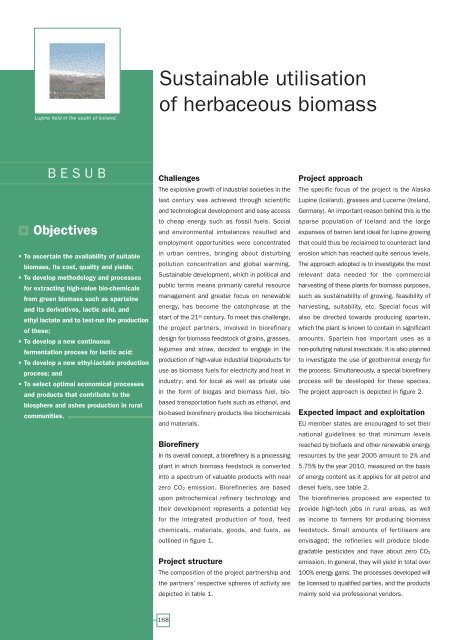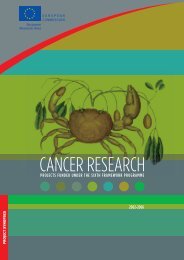European Bio-Energy Projects
European Bio-Energy Projects
European Bio-Energy Projects
Create successful ePaper yourself
Turn your PDF publications into a flip-book with our unique Google optimized e-Paper software.
Lupine field in the south of Iceland.<br />
BESUB<br />
Objectives<br />
• To ascertain the availability of suitable<br />
biomass, its cost, quality and yields;<br />
• To develop methodology and processes<br />
for extracting high-value bio-chemicals<br />
from green biomass such as sparteine<br />
and its derivatives, lactic acid, and<br />
ethyl lactate and to test-run the production<br />
of these;<br />
• To develop a new continuous<br />
fermentation process for lactic acid;<br />
• To develop a new ethyl-lactate production<br />
process; and<br />
• To select optimal economical processes<br />
and products that contribute to the<br />
biosphere and ashes production in rural<br />
communities.<br />
Sustainable utilisation<br />
of herbaceous biomass<br />
Challenges<br />
The explosive growth of industrial societies in the<br />
last century was achieved through scientific<br />
and technological development and easy access<br />
to cheap energy such as fossil fuels. Social<br />
and environmental imbalances resulted and<br />
employment opportunities were concentrated<br />
in urban centres, bringing about disturbing<br />
pollution concentration and global warming.<br />
Sustainable development, which in political and<br />
public terms means primarily careful resource<br />
management and greater focus on renewable<br />
energy, has become the catchphrase at the<br />
start of the 21st century. To meet this challenge,<br />
the project partners, involved in biorefinery<br />
design for biomass feedstock of grains, grasses,<br />
legumes and straw, decided to engage in the<br />
production of high-value industrial bioproducts for<br />
use as biomass fuels for electricity and heat in<br />
industry; and for local as well as private use<br />
in the form of biogas and biomass fuel, biobased<br />
transportation fuels such as ethanol, and<br />
bio-based biorefinery products like biochemicals<br />
and materials.<br />
<strong>Bio</strong>refinery<br />
In its overall concept, a biorefinery is a processing<br />
plant in which biomass feedstock is converted<br />
into a spectrum of valuable products with near<br />
zero CO2 emission. <strong>Bio</strong>refineries are based<br />
upon petrochemical refinery technology and<br />
their development represents a potential key<br />
for the integrated production of food, feed<br />
chemicals, materials, goods, and fuels, as<br />
outlined in figure 1.<br />
Project structure<br />
The composition of the project partnership and<br />
the partners’ respective spheres of activity are<br />
depicted in table 1.<br />
168<br />
Project approach<br />
The specific focus of the project is the Alaska<br />
Lupine (Iceland), grasses and Lucerne (Ireland,<br />
Germany). An important reason behind this is the<br />
sparse population of Iceland and the large<br />
expanses of barren land ideal for lupine growing<br />
that could thus be reclaimed to counteract land<br />
erosion which has reached quite serious levels.<br />
The approach adopted is to investigate the most<br />
relevant data needed for the commercial<br />
harvesting of these plants for biomass purposes,<br />
such as sustainability of growing, feasibility of<br />
harvesting, suitability, etc. Special focus will<br />
also be directed towards producing spartein,<br />
which the plant is known to contain in significant<br />
amounts. Spartein has important uses as a<br />
non-polluting natural insecticide. It is also planned<br />
to investigate the use of geothermal energy for<br />
the process. Simultaneously, a special biorefinery<br />
process will be developed for these species.<br />
The project approach is depicted in figure 2.<br />
Expected impact and exploitation<br />
EU member states are encouraged to set their<br />
national guidelines so that minimum levels<br />
reached by biofuels and other renewable energy<br />
resources by the year 2005 amount to 2% and<br />
5.75% by the year 2010, measured on the basis<br />
of energy content as it applies for all petrol and<br />
diesel fuels, see table 2.<br />
The biorefineries proposed are expected to<br />
provide high-tech jobs in rural areas, as well<br />
as income to farmers for producing biomass<br />
feedstock. Small amounts of fertilisers are<br />
envisaged; the refineries will produce biodegradable<br />
pesticides and have about zero CO2<br />
emission. In general, they will yield in total over<br />
100% energy gains. The processes developed will<br />
be licensed to qualified parties, and the products<br />
mainly sold via professional vendors.

















